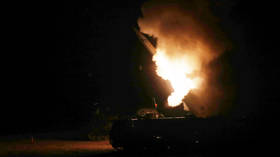Moscow says Iran didn’t refuse to enrich uranium in Russia
Iran has not rejected an offer to enrich its uranium in Russia, and is preparing an official response to the proposals of the International Atomic Energy Agency, said Russia’s Foreign Minister.
Sergey Lavrov made the comment on Tuesday, on his way back to Moscow from India, following a meeting between Russia, India and China.
"There has been no refusal,” he said. Currently “we are expecting official confirmation from the Iranians of the plan that was agreed upon.”
Earlier on Tuesday, RIA Novosti, citing the Jewish Telegraphic Agency, wrote that Tehran would move forward with its nuclear program as long as Israel possesses nuclear weapons.
Iranian President Mahmoud Ahmadinejad made his comment during a meeting with Turkish Prime Minister Recep Tayyip Erdogan.
"When an illegal regime possesses nuclear weapons, the other countries' rights for peaceful nuclear energy cannot be denied," he said.
Israel does not admit to having nuclear weapons.
On October 12, following Tehran’s confession that it has a second uranium enrichment facility in the city of Qom, the US, France, Russia, Iran and the IAEA met for talks in Vienna. The sides discussed a plan under which the low-grade uranium produced at the Iranian plant in Natanz would be sent to Russia for further enrichment. The higher-grade material would then be used to make nuclear fuel rod assemblies in France and delivered to Iran’s power plants.
New START – Lavrov on new strategic arms reduction
Sergey Lavrov also commented on the new Strategic Arms Reduction Treaty (START) set to be signed soon between Russia and the US. The current one expires on December 5.
The US is willing to take Russia's key concerns into consideration and will soon submit its proposals. However, according to Lavrov, the new START treaty will have more flexible conditions than the previous one.
One of the concerns of the Russian side has been Washington having plans to develop a new type of strategic arms without a nuclear charge. Lavrov said that Moscow is waiting to receive in the near future new proposals from Washington which would take into account these concerns of the Russian side.
The Russian Foreign Minister also said that these proposals could include the idea that surveillance mechanisms on the amount of nuclear arms on both sides should be more transparent.
Lavrov stressed that even though the old treaty expires on December 5, the deadline does not pose a problem and negotiations will not stop. He added that there are enough legal mechanisms to continue the talks as long as both sides show the will.
Lavrov said that both Moscow and Washington are really concerned and intend to have the issue resolved.












